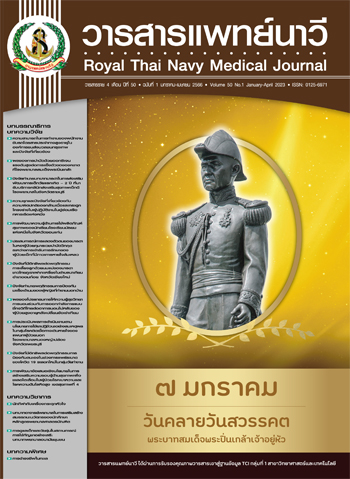Factors Predicting Breast Cancer Prevention Behavior of Women Working Outside the Home
Main Article Content
Abstract
The purpose of this research was to study the factors predicting breast cancer prevention behavior among 265 working women aged 20 years and over. Data were collected by health belief questionnaire. The reliability of the tools, knowledge, perception and behavior were tested at 0.89, 0.75 and 0.81 respectively. The data were analyzed by frequency, percentage, mean, standard deviation and multiple regression analysis with hierarchical regression method.
The results showed that the samples aged 21 - 79 years (Mean = 41.23, SD = 10.10), average BMI 23.04 kg/m2 (SD = 4.71), 44.90% were office workers, 47.20% were never pregnant, 40.40% had hormonal contraception, and 58.50% never had a mammogram. The average knowledge score, perception of each part and behavior were more than 50 percent of the full score. The results of the multiple regression analysis revealed that the perceived self-efficacy, history of having a mammogram and academic work characteristics, were contributing factors to predicting breast cancer prevention behavior by 26.8% with statistical significance at the .05 level.
Recommendations from this study should educate people about breast cancer awareness, to increase knowledge of proper breast examination, and encouraging government and non-governmental agencies to have a policy for all women personnel in the unit to undergo mammograms. In addition, there should be a study of lifestyle, health behaviors of women with different job characteristics in order to develop a plan that will lead to preventive behavior adjustment for future health care.
Article Details

This work is licensed under a Creative Commons Attribution-NonCommercial-NoDerivatives 4.0 International License.
References
International Agency for Research on Cancer. Breast cancer awareness month 2021. [Internet]. [cited 2022 February 18]. Available from: https://www.iarc.who.int/featured-news/breast-cancer-awareness-month-2021/.
World Health Organization. Cancer. [Internet]. [cited 2021 December 1]. Available from: https://www.who.int/news-room/fact-sheets/detail/cancer.
Shama V, Jarin C, Kosin W, Aumkhae S, Ongart S, Damnern V, et al. Breast cancer incidence trends and projections in northeastern Thailand. Journal of Epidemiology 2018;28(7):323-30.
National Cancer Institute. Cancer registration at the hospital level B.E. 2563. Bangkok: Medical Record and Databased Cancer Unit, Medical Digital Division, National Cancer Institute; 2021. (in Thai).
American Cancer Society. Breast cancer risk and prevention. [Internet]. [cited 2022 February 18]. Available from: https://www.cancer.org/cancer/breast-cancer/risk-and-prevention.html.
Center for Disease Control and Prevention. Breast cancer. [Internet]. [cited 2022 January 19]. Available from: https://www.cdc.gov/cancer/breast/basic_info.
National Breast Cancer Foundation. Risk factor. [Internet]. [cited 2022 January 19]. Available from: http://www.nationalbreastcancer.org/breast-cancer-risk-factors.
Bowen DJ, Fernandez, Poole S, White M, Lyn R, Flores DA, et al. The role of stress in breast cancer incidence: risk factors, interventions, and directions for the future. International Journal of Environment Research and Public Health 2021;18:1817.
Chiriac VF, Baban A, Dumitrasuc DL. Psychological stress and breast cancer incidence: a systematic review. Clujul Medical 2018;91(1):18-26.
asuda MT, Sakakibara H, Shimoi K. Estrogen- and stress-induced DNA damage in breast cancer and chemoprevention with dietary flavonoid. Genes and Environment 2017;39(10). doi: 10.1186/s41021-016-0071-7.
Masaaki K, Kathleen ME, Mei-Tzu CT, Christopher IL. Active smoking and risk of estrogen receptor positive and triple negative breast cancer among women 20 - 44 years of age. Cancer 2014;120(7):1026–34.
Department of Mental Health. Department of Mental Health reveals working age people in Bangkok. 45% of happiness is stolen by stress. [Internet]. [cited 2022 February 18]. Available from: https://www.dmh.go.th/news-dmh/view.asp?id=28253.
Detboon P, Mingmai K, Jumneansuk A, Munsawaengsub C, Nunthamongkolchai S. Wife’s perspective of equality in family. Journal of MCU Peace Study 2017;5(1):41-55. (in Thai).
Aksornsri A, Saengsuwan W. The role of Thai women in the Thailand 4.0 era. The Journal of Research and Academics 2021;4(3):297-310. (in Thai).
Sirisamphan T, Nonsi S, Thitiphanrangsarit N. Women’s celibacy in the era of globalization and economy in Thailand. Thammasat Journal 2019;38(3):27-44. (in Thai).
Suphaket B, Suriya J. The evaluation of breast self – examination behavior among Thai female under the Project Royal Grandmother’s Initiative Against Breast Cancer. [Internet]. [cited 2022 February 21]. Available from: https://hp.anamai.moph.go.th/.
Tritipsombut J. The relationships between knowledge, health perception and breast cancer preventive behaviors in risk group women. Journal of the Office of DPC 7 Khon Kaen 2019;26(3):13-24. (in Thai).
Chotsangsakorn R, Thanasilp S, Pudtong N. Predicting factors of breast cancer screening behaviors among menopausal women. Kuakarun Journal of Nursing 2019;26(2):107-20. (in Thai).
Chomchuen T, Surath S, Mukchanan B. Predicting factors of breast self- examination efectiveness of health volunteers in Chiang Rai province. Journal of Community Development and Life Quality 2016;4(3):389-400. (in Thai).
Glanz K, Lewis FM, Rimer BK, editors. Health behavior and health education: theory research and practice. 2nd ed. San Francisco, CA: Jossey-Bass Publishers; 1997.
Thotong R, Somharnwong S, Sangrajrang S, Pichainarong N, Satitvipawee P, Pitikultang S, et al. Factors related to breast self-examination practices among premenopausal women. Thai Cancer Journal 2019;39(1):16-27. (in Thai).
Buranaruangrote S. Factors related to breast self-examination behavior in Thai women living in Ongkharak district Nakhonnayok. Journal of Behavioral Science for Development 2016;8(1):279-94. (in Thai).
Thaithae S, Thanaboonpuang P, Mahaprom T. Factors affecting health care behaviors of the elderly among urban community in Bangkok. Royal Thai Navy Medical Journal 2021;48(2):393-406. (in Thai).
Hongkrajok H, Pathumarak N, Masingboon K. Influences of health literacy, perceived self-efficacy, and patient-health care provider communication on self-care behaviors among patients with primary hypertension. Royal Thai Navy Medical Journal 2019;43(2):39-54. (in Thai).
Cohen J. Statistical power analysis for the behavioral sciences. 2nd ed. Hillsdale, New Jersey: Lawrence Erlbaum Associates, Publishers; 1988. p. 102.
Kanchanachitra M, Suttikasem K, Tadee R. Birth promotion through work-life balance and quality of family. Nakorn Pathom: Institute for Population and Social Research. The Thailand R.esearch Fund; 2016. (in Thai).


